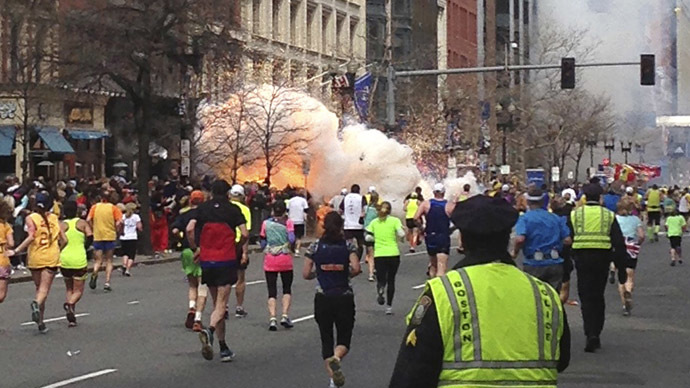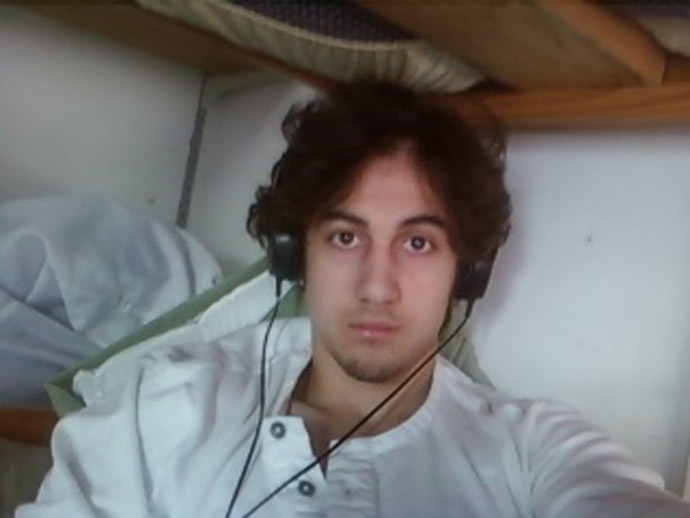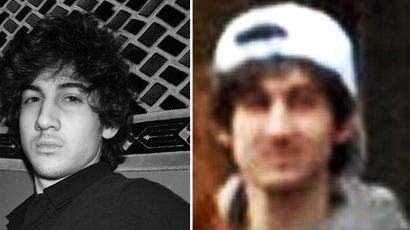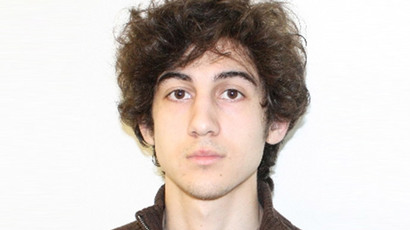Tsarnaev found guilty on all charges in Boston Marathon bombing

Dzhokhar Tsarnaev, the man charged with the Boston Marathon bombing in April 2013, has been found guilty of all 30 charges he faced. The guilty verdicts mean he is eligible for the death penalty.
The 21-year-old needed only to be found guilty of one of the 17 capital charges for the death penalty to be applicable.
Tsarnaev was convicted of conspiracy to use a weapon of mass destruction, possession and use of a firearm during a crime of violence, conspiracy to bomb a place of public use, bombing in a place of public use, conspiracy to maliciously destroy property, and malicious destruction of property by means of an explosive, all of which caused death.
He was also found guilty of 11 charges in which the crimes did not result in death. Those counts included carjacking, resulting in serious bodily injury; interference with commerce by threats and violence; possession and use of a firearm during a crime of violence; and use of a weapon of mass destruction.
The firearms and weapons of mass destruction used included a Ruger P95 9mm semiautomatic handgun, three pressure-cooker bombs and three pipe bombs.
The jury in the trial reached a verdict after 11 hours of deliberation.
Tsarnaev’s lawyer, Judy Clarke, has acknowledged that her client “fully participated” in the bombing, conceding that it was her client shown in surveillance footage leaving behind a bomb hidden in a backpack.
However, she argued, he was an impressionable young man in the sway of his older brother, Tamerlan, who had become a radicalized Muslim and whom she accused of masterminding the attack. Clarke said her client should thus be spared the death penalty.
"We don't deny that Dzhokhar participated in these events, but if not for Tamerlan it would not have happened,” Clarke said in her closing statements.

On April 15, 2013 twin blasts, 12 seconds apart, rocked the finish line of the storied Boston Marathon. Over 170 people were injured, with three killed, including an eight-year-old boy. Four days later, in the early morning hours, a Massachusetts Institute of Technology police officer was killed and a man was carjacked, leading law enforcement on a manhunt from Cambridge, Massachusetts to the nearby suburb of Watertown.
By that point, officials had identified the two suspects as Tsarnaev, then 19, and his older brother Tamerlan, 26.
In Watertown, the suspects engaged in a firefight with law enforcement, during which Tamerlan was killed. The area was placed on lockdown as SWAT teams from multiple local and federal jurisdictions searched for the surviving brother. He was eventually found hiding in a boat on a resident’s property.
Tsarnaev’s trial began in Boston on March 4 after weather delays in February, with 17 days of testimony over the course of four weeks. Defense attorneys had requested that the trial be moved outside of Boston to the western Massachusetts city of Springfield, to New York City or to Washington, DC, claiming the juror pool in Boston was already biased against their client.
Court will reconvene at 1:45 for jury's verdict in Tsarnaev case.
— U.S. Attorney MA (@DMAnews1) April 8, 2015
During deliberations Tuesday afternoon, the jury submitted two questions to US District Judge George A. O’Toole Jr. One question was whether “conspiracy” can be a distinct event or something that takes place over a longer period, which O’Toole told them was something that they had to determine for themselves, the New York Times reported.
The other question was about the difference between “aiding” and “abetting.” The judge told jurors that aiding and abetting is a single concept about helping someone commit a crime.
O’Toole also told jurors that, if they find Tsarnaev guilty of three specific counts of the 30 he was charged with, they must also unanimously decide whether the actions described in those three counts resulted in the deaths of each of three marathon bombing victims as well as the death of the MIT police officer.
Judge now giving instructions, tells jurors "you are still an active jury." Orders them to avoid any discussion of case. #Tsarnaev
— WBUR Live (@wburLive) April 8, 2015
The case now moves out of the guilt phase and into the punishment phase. The same jury will hear evidence and then decide whether to sentence him to death or life in prison without possibility of parole. The schedule for the next phase is undetermined, but could begin as early as next week, the judge said.














